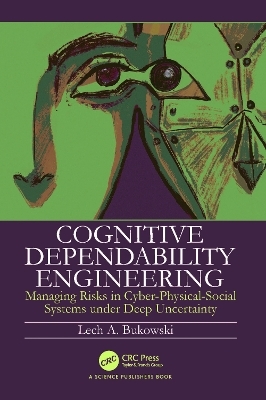
Cognitive Dependability Engineering
CRC Press (Verlag)
978-0-367-89730-7 (ISBN)
The work is a context-oriented analysis and synthesis of complex engineered systems to ensure continuous and safe operations under conditions of uncertainty. The book is divided in four parts, the first one comprises an overview of the development of systems engineering: starting with basics of Systems Science and Single Systems Engineering, through System of Systems Engineering to Cognitive Systems Engineering. The Cognitive Systems Engineering model was based on the concept of imperfect knowledge acquisition and management. The second part shows the evolutionary character of the dependability concept over the last fifty years. Beginning from simple models based on the classical probability theory, through the concepts of tolerating faults, as well as resilience engineering, we come to the assumptions of Cognitive Dependability Engineering (CDE), based on the concept of continuous smart operation, both under normal and abnormal conditions. The subject of the next part is analysis and synthesis of Cyber-Physical-Social (CPS) Systems. The methodology consists of the following steps: modeling CPS systems' structure, simulating their behavior in changing conditions and in situations of disruptions, and finally assessing the dependability of the entire system based on CDE. The last part of the work answers the question of how to deal with risks in CPS systems in situations of high level of uncertainty. The concept of a Cognitive Digital Twin was introduced to support the process of solving complex problems by experts, and on this basis a framework for cognitive dependability based problemsolving in CPS Systems operating under deep uncertainty was developed. The possibilities and purposefulness of using this framework have been demonstrated with three practical examples of disasters that have happened in the past and have been thoroughly analyzed.
Lech A. Bukowski is a professor of Management Engineering at WSB University, Dąbrowa Górnicza, Poland. He obtained a PhD (1976) and DSc (1990) from the AGH University of Science and Technology Cracow and became a Professor of Engineering in 1998. He became a Professor Honoris Causa in the Technical University Clausthal (Germany) in 2003. He is an active member of the scientific committees of many international conferences (e.g., honorary chairman of the Carpathian Logistics Congress), he is on the editorial board of 5 scientific periodicals, and a member of the Siemens Award Chapter. His professional career which began in 1966, includes “Azoty Tarnów” (chemicals manufacturer) in and “Nowa Huta” (metals manufacturer) in Cracow. His foray in includes being academia, lecturer at the AGH University of Science and Technology in Cracow (1976); an Assistant Professor at the Technical University Clausthal in Germany (1981 to 1987). He was the Head of Department for Systems Quality and Reliability (1994 to 2003), and from 2003 to 2013 he was in the Faculty of Management, AGH University as a Head of the Systems Engineering Chair, and a Dean of the Faculty. He has been Director, Business Engineering Center at WSB University since 2013. His interests include Systems Science, especially Systems Engineering, and Industrial Logistics. He has published more than 230 scientific papers and has authored 12 monographs in Polish, English and German and has six patents.
Preface. Introduction. PART I. DEVELOPMENT OF SYSTEMS ENGINEERING CONCEPTS: FROM SINGLE SYSTEMS ENGINEERING TO COGNITIVE SYSTEMS ENGINEERING. Basics of Systems Science. Systems Engineering. System of Systems Engineering. Cognitive Systems Engineering. PART II. CONCEPTS OF ATTRIBUTE-ORIENTED SYSTEMS ENGINEERING: FROM RELIABILITY ENGINEERING TO COGNITIVE DEPENDABILITY ENGINEERING. Reliability Engineering: The Concept of Failure-free Operation. Safety Engineering: The Concept of Effective Protection. Security Engineering: The Concept of Cyber-security. Resilience Engineering: The Concept of Process Continuity. Dependable Computing: The Concept of Fault-tolerant Functioning. Cognitive Dependability Engineering: The concept of Trustworthy Performance. PART III. MODELLING AND SIMULATION THE OPERATION OF CYBER-PHYSICAL-SOCIAL SYSTEMS IN A RISKY ENVIRONMENT. Methodology of Modelling and Simulation Used for Complex Systems. Modelling of Cyber-Physical-Social Systems. Simulation of Cyber-Physical-Social Systems Behaviour in a Risky Environment. PART IV. MANAGING RISKS IN CYBER-PHYSICAL-SOCIAL SYSTEMS UNDER DEEP UNCERTAINTY. Uncertainty-oriented Concepts of Decision-making. Cognitive Dependability-based Problem-solving in Cyber-Physical-Social Systems Operating under Deep Uncertainty. Application Examples: Lesson Learned from Case Studies. Summary and Concluding Considerations. Glossary. Index.
| Erscheinungsdatum | 20.07.2023 |
|---|---|
| Zusatzinfo | 15 Tables, black and white; 2 Line drawings, color; 48 Line drawings, black and white; 1 Halftones, color; 1 Halftones, black and white; 3 Illustrations, color; 49 Illustrations, black and white |
| Verlagsort | London |
| Sprache | englisch |
| Maße | 156 x 234 mm |
| Gewicht | 1040 g |
| Themenwelt | Geisteswissenschaften ► Psychologie ► Allgemeine Psychologie |
| Geisteswissenschaften ► Psychologie ► Verhaltenstherapie | |
| Informatik ► Theorie / Studium ► Künstliche Intelligenz / Robotik | |
| Technik ► Maschinenbau | |
| ISBN-10 | 0-367-89730-X / 036789730X |
| ISBN-13 | 978-0-367-89730-7 / 9780367897307 |
| Zustand | Neuware |
| Informationen gemäß Produktsicherheitsverordnung (GPSR) | |
| Haben Sie eine Frage zum Produkt? |
aus dem Bereich


